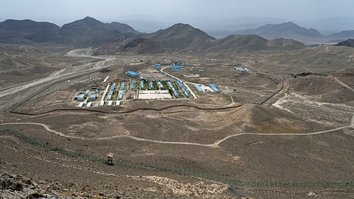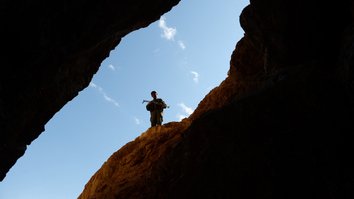PARIS -- The Taliban now hold the keys to an untouched trillion-dollar trove of minerals, including some that could power the world's transition to renewable forms of energy, but few countries are showing interest in doing business with the group.
The Taliban are already in a financial bind since they returned to power 20 years after their ouster, as major aid organisations have halted their support for Afghanistan.
On Tuesday (August 24), the World Bank announced that it had halted aid to the country.
Afghanistan has long struggled to tap its vast deposits because of wars and poor infrastructure.
![Afghan miners work at a factory near the village of Qara Zaghan in Baghlan province on May 6, 2013. [Shah Marai/AFP]](/cnmi_st/images/2021/08/30/31337-af-factory-baghlan-585_329.jpg)
Afghan miners work at a factory near the village of Qara Zaghan in Baghlan province on May 6, 2013. [Shah Marai/AFP]
The country's resources include bauxite, copper, iron ore, lithium and rare earth elements, according to a January report by the US Geological Survey (USGS).
Copper, which is needed to make power cables, became a hot commodity this year, resulting in prices exceeding $10,000 per tonne.
Lithium is a crucial element to make electric car batteries, solar panels and wind farms, and the global demand for it is expected to grow by more than 40-fold by 2040, according to the International Energy Agency.
Afghanistan "sits on a huge reserve of lithium that has not been tapped to this day", said Guillaume Pitron, author of the book "The Rare Metals War".
Afghanistan is also home to rare earth elements that are used in the clean energy sector: neodymium, praseodymium and dysprosium.
The country's untapped mineral riches have been estimated at $1 trillion by the USGS, though Afghan officials have estimated the value to be three times higher.
While Afghanistan has struggled with extracting rare earth elements, it has been more successful digging for precious stones such as emeralds and rubies as well as semi-precious tourmaline and lapis lazuli, but the business is plagued with illegal smuggling to Pakistan.
The country also mines for talc, marble, coal and iron.
China chooses profits over principles
While the Taliban's takeover may deter foreign investors, one country that appears willing to do business with them is China.
Beijing said it was ready to have "friendly and co-operative" relations with Afghanistan after the Taliban entered Kabul on August 15.
The state-owned China Metallurgical Group Corporation (MCC Group) won rights in 2007 to lease the giant Mes Aynak copper ore deposit for 30 years and to extract 11.5 million tonnes of the commodity.
But the project to tap the world's second-largest unexploited copper deposit has yet to re-open and start operations "due to safety issues", according to Chinese state-run tabloid Global Times.
Global Times cited an MCC Group source as saying that it would "consider reopening it after the situation is stabilised, and international recognition -- including the Chinese government's recognition of the Taliban regime -- takes place".
While Chinese leaders are "not enthusiastic" about the Taliban takeover, "they will not allow principle to stand in the way of pragmatism", Ryan Hass, a senior fellow at the Washington-based Brookings Institution think tank, stated in a blog.
"Beijing's lack of development at its major investment in the Mes Aynak copper mine demonstrates its willingness to exercise patience in pursuit of return on investment," he wrote.
The Chinese "don't condition their business deals on democratic principles", said the French author Pitron.
There is no certainty that Afghanistan will become a mineral El Dorado, he warned.
"For that, you need a very stable political climate," Pitron said.
It can take as long as 20 years between the discovery of a mineral deposit and the start of mining operations, he said.
"No company will want to invest if there is no stable political and legal system," he said.

![An Afghan labourer works at a chalk factory on the outskirts of Mazar-e-Sharif on June 20, 2018. [Farshad Usyan/AFP]](/cnmi_st/images/2021/08/30/31336-af-chalk-factory-585_329.jpg)







All countries, including China, are pursuing their own interests in Afghanistan, and the plundering of Afghanistan's national resources is worrying.
Reply2 Comment
It is said that a father and son were eating food together. There was a potato on the plate which was not cooked well. The son tried to break it into pieces and eat it, but the potato moved here and there on the plate. Then his father took the potato and ate it in full. His son told him, father, I made it tired, but you ate it alone. :) In Afghanistan, Americans made efforts, and it looks like the potato, the mines remained for China to eat. Afghans should know that China never assists Afghanistan for free. It is correct that our people like freedom, but we had to get the advantage of Americans' knowledge, technology, aids, and technics to become equal to our neighbors.
Reply2 Comment